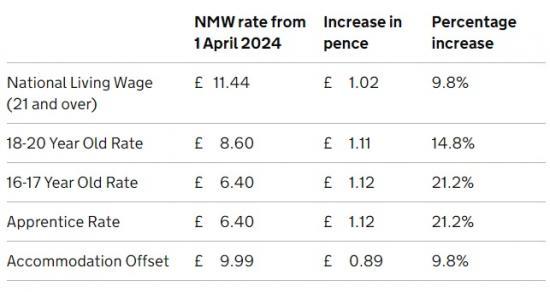Starting from 1 April 2025, the National Minimum Wage (NMW) is set to rise, reflecting the ongoing cost of living increases under Labour’s “Plan to Make Work Pay.” This significant change aims to improve wages across the board, ensuring fair pay for workers while considering the broader economic impact.
Government's Focus on Fair Wages
The new Labour government has placed a strong emphasis on workers’ rights and fair pay. To ensure that the NMW keeps pace with the cost of living, the Low Pay Commission (LPC) has been tasked with reviewing its wage-setting process. This review is part of a broader initiative to ensure that every adult, regardless of age, receives a fair wage.
One key element of this plan is to narrow the gap between the National Minimum Wage for younger workers (aged 18–20) and the National Living Wage, which applies to those aged 21 and over. This change is expected to gradually unify wage rates for all adults, promoting equality and fairness in the workplace.
Balancing Worker Rights and Business Sustainability
While the primary focus is on improving wages, the LPC is also mindful of the potential impact on businesses, the labour market, and the economy as a whole. The challenge lies in balancing the need for higher wages with the realities of running a business. The government remains committed to a full consultation process before implementing these changes, ensuring that both workers and businesses have a voice.
Part of a Wider Agenda for Workplace Reform
The proposed increase in the NMW is just one part of the government’s broader agenda to reform workplace rights. In line with its pre-election manifesto, the Labour party has outlined a series of workplace reforms under the “Make Work Pay” initiative. These reforms include revising trade union legislation, reducing government outsourcing, and ending the controversial “fire and rehire” practices.
Moreover, the government has pledged to introduce “day one rights” for workers, covering unfair dismissal, parental leave, and sick pay. These rights will be subject to employer probationary periods and other yet-to-be-determined exemptions.
For a more in-depth look at how these changes could impact employers, see our detailed article on How the Election Results May Affect Employers.
Current National Minimum Wage Rates
Preparing for the NMW Increase
With the significant rise in the NMW in April 2024 and another expected in April 2025, businesses must prepare now. Key steps include:
- Reviewing Financial Forecasts: Adjust budgets to account for higher wage costs.
- Optimising Workforce Efficiency: Invest in training and performance management to boost productivity.
- Streamlining Operations: Explore cost-saving measures to offset increased wages.
Employers should also consider reviewing salary structures and benefits packages to create a more tax-efficient pay strategy. With the mandatory payrolling of benefits starting in April 2026, a proactive approach will be crucial.
It’s also important to review any existing salary sacrifice schemes to ensure they do not reduce salaries below the new NMW rates.
Strategic Planning for Businesses
To manage the impact of wage increases, businesses should consider:
- Adjusting Pricing Strategies: To reflect higher operational costs.
- Exploring New Revenue Streams: To diversify income sources.
- Negotiating with Suppliers: To secure better terms and reduce costs.
- Enhancing Employee Retention: To minimise recruitment expenses.
Investigating government incentives and engaging in long-term strategic planning will also be vital to maintaining profitability amidst rising wage costs.
At Plymouth Accountancy Hub, we can help you navigate these changes and develop strategies to keep your business financially healthy.
The Debate: Pros and Cons of Increasing the NMW
Arguments For:
- Poverty Reduction: Higher wages can help lift workers out of poverty and improve living standards.
- Income Equality: Narrowing the wage gap between low-wage and higher-wage workers.
- Boosting Consumer Spending: Increased disposable income for workers can stimulate the economy.
- Reduced Reliance on Welfare: Higher wages can decrease dependence on social welfare programs.
- Improved Productivity: Better pay can lead to higher employee morale and productivity.
Arguments Against:
- Impact on Small Businesses: Higher wages may lead to job cuts or reduced hours.
- Inflationary Pressure: Increased costs could be passed on to consumers, driving inflation.
- Reduced Hiring: Businesses may be less inclined to hire due to increased labour costs.
- Automation Risk: Higher wages could accelerate the shift towards automation.
- Regional Disparities: Uniform wage increases may not account for regional cost of living differences.
- Compliance Costs: Implementing higher wages could increase administrative burdens.
The LPC will carefully weigh these arguments before making its final recommendations in October 2024.
Fiscal Impact: NMW and Tax Thresholds
It’s worth noting that while the NMW increase will boost gross earnings, the impact may be lessened by the frozen personal tax allowances, which remain at £12,570 until 2028. This “fiscal drag” could mean that workers will see more of their earnings subject to taxation.
Ensuring Compliance
HMRC continues to enforce NMW compliance vigorously. Employers found in breach of the regulations can face penalties, be required to repay arrears, and may even be publicly named and shamed. Staying compliant is not just a legal obligation but a reputational one too.
Need Help Preparing?
At Plymouth Accountancy Hub, we’re here to help you navigate these changes and ensure your business is ready for the 2025 NMW increase. Contact us today for expert advice and support.







